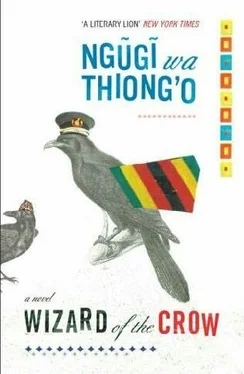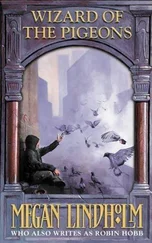For the first time all the envoys gave him warm applause; this spurred him on.
“If at this time there is anybody from the public gallery who would like to ask a question or make some comments, they can go ahead.”
This had never happened in the brief history of Aburirian Parliament: the gallery being allowed to intervene. Most people took it for a rhetorical gesture, except for one wizened old man who stood up and spoke in a thin, tremulous voice but one loud enough to be heard by all.
“Thank you, My Lord of Infinite Mercy and Kindness. I say thank you because once a long time ago I attempted to speak to you and the minister in charge of the ceremonies ordered the police to deny me the microphone and remove me from the platform. I went away screaming for you to hear me. You heard my cry. I know that is why you removed him. And that is why I thank you, Mkundu Wangu Mpya Rahisi, for hearing my cry then and now giving me a chance to redeem my name so dishonored by the late Machokali. I say with you, Down with state secrets.”
The phrase My New Cheap Arsehole had made A.G. suddenly recall the same old man trying to speak at the ceremony where the plan for Marching to Heaven was first revealed publicly. How was the leader going to handle this? But at that point the official hostess, Dr. McKenzie, whispered in the ear of the Ruler, who now asked the security to take the old man to the State House, where both would later meet for an exchange of views in endless leisure. The Ruler was a genius of double talk, A.G. said to himself, because he knew exactly what the security had been told to do with the old man. Every opinion counts, said the Ruler. The reign of Baby D has begun.
Now, in response to the call on him to divulge state secrets, he had a few to share with the nation. He was giving amnesty to all political inmates, including those under house arrest. He was doing this because some had already confessed and repented their sins. Sikiokuu, for instance, had confessed in writing that, wearing robes of a religion of doubt, he had contacted fanatical followers of the Frenchman by the name of Descartes with evil intentions against the government. The only ones that the Ruler would never set free were those convicted of crimes of thought, mostly followers of the Movement for the Voice of the People. They were unrepentant. He challenged Parliament to come up with a comprehensive anticorruption bill, as in his view there was no corruption worse than that of the mind.
The MPs were about to give him another standing ovation but he waved them off, for he was about to reveal corruption in high places. The new Aburiria could not afford to sweep its own dirt under the rug. It must show itself and the world that it was ready to bring to the light of day all the bones in its closet. He would also address economic chaos and sabotage. A helicopter had crashed in the hills near Eldares after a relentless chase by “our well-trained airborne police.” The helicopter was full of counterfeit money. The pilot had not yet been found. He could not say much more about the matter, as it was still under investigation.
The police were trying to ascertain the connection between the helicopter, counterfeit money, and a recent spate of bank robberies themselves strange because the robbers seemed less interested in paper money than in papers about money. They often broke safes where bank papers were kept or into computers, and left safes containing money and jewelry untouched. Well, two of these odd robbers were caught in a Mwathirika bank, putting counterfeit money into the safe. From these captives the police learned that the mastermind had intended economic chaos through the unregulated supply of money and bribes to abort the birth of Baby D. The Ruler wanted to say loud and clear that in his government, and in his country, there was no hiding place for the corrupt, be they the top officers of his security forces or the highest-ranked ministers in his government. Bring out the saboteurs, he bellowed.
Two men, shackled, each with a sackful of freshly minted notes, were dragged into the chamber.
A.G. felt as if his eyes would pop out. Kahiga and Njoya were being put on display.
“These are the sinners,” the Ruler hissed, pointing at them with his club as they trembled, their chains clanking. “And, even worse, these were two of my top security men! They were recently dismissed from their jobs for letting themselves be guided by witchcraft in their work. And what do they do next? Turn to bank robbery. Economic sabotage. Let me say this to all the corrupt in the land: come forward, confess, and repent before it is too late. These two will now be put under lock and key, and, believe me, by the time I finish with them, they will have told me all I need to know about those with ill intent against the newborn Baby D.”
A.G., who had not waited for the end of the ceremony, caught up with the rest of the Ruler’s address in the newspapers the following day. New ministers to nurture Baby D were announced. Two women were appointed to Parliament and made Assistant Ministers for Women’s and Children’s Affairs. The Ruler promised to rely on his two pillars of wisdom in his furtherance of the needs of Baby D. One of them was Tajirika, erstwhile governor of the Central Bank, who was now back as a member of Parliament and Minister of Finance. The other was John Kaniürü, the ex-youth leader, now the
Minister for Defense, Youth, and Culture. The Ruler was quoted as praising a paper Kaniürü had once written, the result of a highly successful series of youth seminars in which he had argued that the youth must be deployed to fight the enemies within to complement the work of the security forces, and that culture should be used to cleanse the minds of the young of all rebelliousness. The Ruler, when he first read the paper, had been very impressed by Kaniürü’s originality, and the phrase originality of thought was what he now used in announcing the appointment of Kaniürü to his new position, with a mandate to oversee the integration of youth, culture, and the military.
Among the heroes honored to mark the new birth was the Late Dr. Wilfred Kaboca, shot dead in defense of the health of the nation, now posthumously inducted into the company of the Golden Order of Loyal Devotion (GOLD).
The paper carried a smaller heading: BIG BEN BECOMES CAESAR: MINISTER COMBINES THE GLORY OF IMPERIAL LONDON AND ANCIENT ROME. The courage he displayed during the so-called People’s Assembly had earned him honorary membership in the armed forces, backdated to months before the assembly. My dream has come true, Minister Big Ben Mambo was quoted as screaming unabashedly. In order that he may always remember the day, he added a new name, becoming Julius Caesar Big Ben Mambo, Minister of Information and Honorary Officer of the Armed Forces of the Free Republic of Aburlria.
A boxed item under the heading ARTIST MASTERS THE ART OF WAR showed a picture of Kaniürü. It was thanks to him that Aburlria was finally rid of the menace of Nyawlra, alias the Limping Witch, and her cohort the Wizard of the Crow. Although not yet identified, their bodies were believed to be decomposing somewhere. Kaniürü had sustained a bullet wound to his left leg while battling these forces of evil and through his bravery had saved the country much turmoil. He became a decorated war hero. Asked where he learned strategy and tactics, Kaniürü told reporters that it was instinct but that he had thoroughly studied Carl Von Clausewitz’s On War and Sun-Tzu’s The Art of War.
A.G. felt strength leave him: so the Wizard of the Crow was deadr
The Ruler was both surprised and pleased at how smoothly everything had worked out, and he wondered why he had ever been afraid of the words multiparty democracy. It was the bad advice from Machokali and Sikiokuu, he decided, for it was only after he had rid himself of both that his relations to the world, Aburlria, and himself began to prosper. But the Ruler’s Political Theory, actually written by the late Machokali but now bearing the Ruler’s name with a preface that the whole theory was written in the period when he was absent from public view, had provided the vision. According to this theory, what was important in any given country was not the quantity of political parties but the character of the person who personified the head, heart, arms, and legs of the state. There are no moral limits to the means that a ruler can use, from lies to lives, bribes to blows, in order to ensure that his state is stable and his power secure. But if he could keep the state stable through sacrificing truth rather than lives, bending rather than breaking the law, sealing the lips of the outspoken with endless trickeries rather than tearing them with barbed-wire and hot wax, if he could buy peace through a grand deception rather than a vast display of armored vehicles in the streets, which often gave his enemies material for propaganda, it would be the sweetest of victories. The theory also called on a ruler to do the unexpected, whether good or bad, in order to catch friend and foe unaware. The third tenet was what he called the principle of giving without giving. Take away ten, make a firm stand on not giving any back, then, under pressure, relent and give back one, and the result is all-around applause, of victory from foe and congratulations from friend. So far he had closely followed the tenets of the theory, with amazing results. The most pleasing was the favorable reception of his performance in the West, including countries that had previously denied him state visits. He was congratulated for his bold and courageous steps, some editorial writers going so far as to call him a democratic visionary whose balance of pragmatism and ideology had caught his foes with their pants down.
Читать дальше












